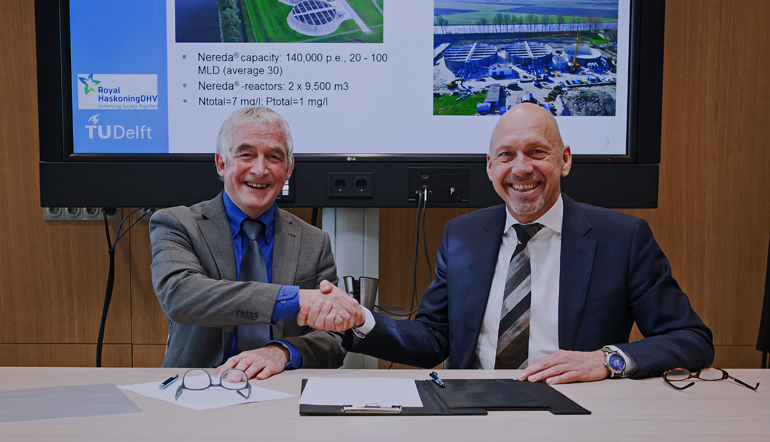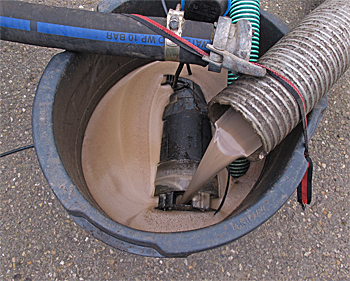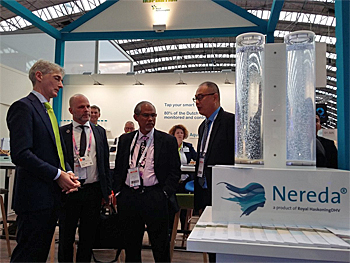Delft University and Royal HaskoningDHV agree on further development biopolymer recovery from wastewater
 Royal HaskoningDHV and Delft University of Technology have signed an agreement that outlines the further development of biopolymer recovery at waste water treatment plants using aerobic granular biomass Nereda-technology. The agreement includes the transfer of patented extraction technologies from the university to Royal HaskoningDHV for worldwide application.
Royal HaskoningDHV and Delft University of Technology have signed an agreement that outlines the further development of biopolymer recovery at waste water treatment plants using aerobic granular biomass Nereda-technology. The agreement includes the transfer of patented extraction technologies from the university to Royal HaskoningDHV for worldwide application.
Vice versa, RoyalHaskoningDHV agreed to fund new PhD research at the university.
 A pilot at Dutch wwtp Apeldoorn showed that it is possible to extract a biopolymer from waste water with the alginate like characteristics.
A pilot at Dutch wwtp Apeldoorn showed that it is possible to extract a biopolymer from waste water with the alginate like characteristics.
Reusable biopolymer
In addition to its small footprint, energy and cost savings, and phosphate recovery, Nereda-technology opens up the opportunity to recover a biopolymer mix produced by the bacteria purifying the wastewater.
This new reusable substance can easily be harvested and has the potential to unlock economically interesting applications in the paper and textile industries, in the agricultural sector, but especially in the development of advanced nanocomposite materials.
The recovery technology originated from research at the Delft University of Technology and the agreement allows Royal HaskoningDHV to apply the rights worldwide.
Enabling new research
Karel Luyben (left on top photo), Rector Magnificus Delft University of Technology: ‘Part of the agreement is that Royal HaskoningDHV will fund PhD research for the coming ten years.’
 Singapore water minister Zulkifli Masagos (middle) showing his interest in Nereda-technology at the Aquatech Amsterdam trade fair in November.
Singapore water minister Zulkifli Masagos (middle) showing his interest in Nereda-technology at the Aquatech Amsterdam trade fair in November.
‘Furthermore', Luyben continued, ‘the company pays for the made patent costs, which will enable the university to hire another PhD researcher, which will open up new fields of research for us.’
René Noppeney (right on top photo), Global Director of Water Technology Products & Innovation at Royal HaskoningDHV: ‘This contract means that Royal HaskoningDHV not only has the patents for the Nereda technology, but also the patents to extract a valuable new raw material from the excess sludge. That is a great combination!’
Circular economy
Delft University of Technology and Royal HaskoningDHV cooperate in a joint national research and development program together with the foundation for applied water research STOWA, Dutch water authorities, global industrial ecosystem Simadan and ChainCraft biosobased innovators to investigate and develop the recovery and reuse of biopolymers derived from wastewater treatment processes.
This development contributes to the further circularization of the economy, and the cost-effective treatment of wastewater.
This news item was originally published on the website of Royal HaskoningDHV and Delft University of Technology (in Dutch only).
Read also on this website
● AIWW 2017: Setting the stage for a circular economy, 20 October 2017
● Large-scale extraction of Nereda alginate from waste water at wwtp Apeldoorn, the Netherlands, 20 April 2017
● Next-step sludge treatment integrates three advanced technologies at wwtp Amersfoort, the Netherlands, 20 June 2016
More information
RoyalHaskoningDHV
Amersfoort, the Netherlands
+31 88 348 20 00
www.rhdhv.com
Delft university of technology
Delft, the Netherlands
+3115 27 89111
www.tudelft.nl/en



